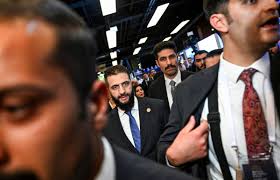U.S. President Donald Trump’s announcement of his intention to lift sanctions on Syria has triggered a flurry of political speculation, economic reactions, and cautious optimism—not only in Damascus, but across the broader region. The Syrian pound surged almost instantly on the black market, gaining nearly 1,500 points against the dollar in less than an hour following Trump’s remarks. Meanwhile, U.S. officials confirmed that Trump is “serious” about sanctions relief, signaling a possible inflection point in Syria’s long isolation from the global financial system.
But beyond the headlines, what would such a dramatic policy shift mean for Syria—and is the country ready to absorb the consequences?
Diplomatic Overture or Strategic Wager?
Speaking from Riyadh during Trump’s Middle East tour, U.S. State Department spokesperson Samuel Werberg emphasized that the administration views recent decisions by the Syrian government with optimism. “The Syrian leadership has taken steps that make us hopeful,” he said in an interview with Al Arabiya, underscoring that any potential sanctions relief does not require a direct meeting between President Trump and Syrian interim President Ahmad al-Sharaa. Instead, Werberg noted that Washington has already conveyed its demands to Damascus, and the ball is now in Syria’s court.
The Syrian government, for its part, has made calculated moves to court U.S. favor—from signaling openness to economic liberalization to proposing regional security arrangements. Trump, meanwhile, described his position bluntly: “We want to give them a fresh start.”
Yet for all its optimism, Washington’s shift is not without conditions. American and regional leaders, including Turkey’s President Recep Tayyip Erdoğan, have reportedly lobbied for easing sanctions, suggesting a broader recalibration of Middle East policy under Trump’s second term.
The Allure and Illusion of Sanctions Relief
Lifting sanctions would, on the surface, open the gates for long-awaited Gulf investment and rekindle dormant Western aid programs. In a country still reeling from more than a decade of war, collapsing infrastructure, and economic dislocation, sanctions relief is being painted—especially by Syrian officials—as a magic bullet for national recovery.
But that assumption is dangerously simplistic.
As analyst Omar Kaddour argues in Al-Modon, sanctions alone are not the root cause of Syria’s economic malaise. While they have undeniably deepened suffering—especially among the poorest segments of society—the foundational issues predate and transcend U.S. policy: systemic corruption, institutional collapse, destroyed infrastructure, and a fragmented security environment.
Even if sanctions were lifted overnight, Syria would still require upwards of $10 billion annually just to kickstart meaningful reconstruction. The country’s estimated total post-war damage nears $500 billion. Energy, healthcare, and education sectors—all central to any viable recovery plan—would require massive and sustained investment. And that assumes a stable security environment and an administration capable of implementing reforms—both of which remain uncertain.
Boom and Bust: The Currency Mirage
Trump’s remarks produced a near-instantaneous appreciation of the Syrian pound in informal currency markets. Rates dropped from 11,500 to 10,600 per dollar in Damascus and Aleppo within an hour. But the market’s euphoria is premature.
The Central Bank of Syria has maintained an official exchange rate of 12,000 per dollar—far above black market levels—indicating either a lack of policy alignment or a desire to maintain fiscal leverage. The recent directive allowing unrestricted cash withdrawals from certain deposit accounts has also contributed to market movement, but experts warn that unless structural reforms follow, the pound’s rebound may prove ephemeral.
Inflation remains a looming threat. Any injection of Gulf aid, absent parallel production and employment growth, could fuel inflationary cycles that hit lower-income Syrians hardest—forcing the same austerity loop the country has endured for years.
The Political Minefield
Beyond economics, sanctions relief is fraught with political complexities. Sharaa’s transitional government is still operating under a five-year roadmap, with an uncertain endgame. Despite signals of pragmatism, major questions remain unanswered: Can the current leadership credibly guarantee security and legal reform? What does transitional justice look like for a population still nursing the wounds of repression and war?
Moreover, the specter of warlordism and non-state militias looms large. The government’s messaging about “remnants” and “unruly factions” may serve as a tool to consolidate internal support, but if taken at face value, it raises doubts about Damascus’s ability to maintain security—ironically undermining its bid for foreign investment.
This contradiction deepens when viewed through the lens of credibility. If Damascus is exaggerating threats to retain external leverage, it risks alienating donors and investors. If not, then it faces the urgent task of proving that it can restore order without backsliding into authoritarianism.
A Historical Opening—Or a Missed Opportunity?
What makes this moment unique is not just the shifting tone in Washington, but the rare convergence of interests across political lines. As Werberg noted, Syrians now have a “historic opportunity” to benefit from relations with the United States in a post-Assad era, free of Iranian dominance. And while Gulf states have signaled readiness to invest, Europe remains cautiously optimistic—eager to curb refugee flows and security threats emanating from Syrian instability.
Still, most of the expected funds, if they arrive, will likely take the form of foreign aid rather than private capital. As Kaddour notes, few private investors will commit to a country with such deep political uncertainty and no credible legal guarantees. Even the Syrian foreign ministry’s invocation of Singapore’s economic model lacks credibility, given the absence of transparent institutions or a culture of rule-based governance.
Conclusion: More Than a Gesture Required
Lifting U.S. sanctions on Syria may provide momentary economic relief and a symbolic nod toward normalization. But it will not, by itself, resolve the country’s deep-rooted crises. True recovery demands far more: genuine political will, inclusive governance, a functioning judiciary, and an environment where Syrians can live without fear—and without relying solely on foreign benevolence.
Trump’s “fresh start” for Syria could be the beginning of a turnaround. Or it could be, as Kaddour warns, a return to the same bottle the country has been stuck in for years—just with a new label.


